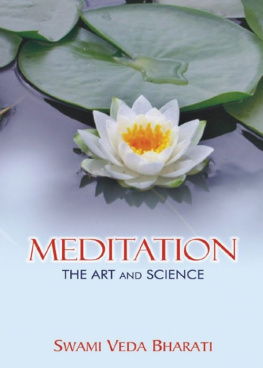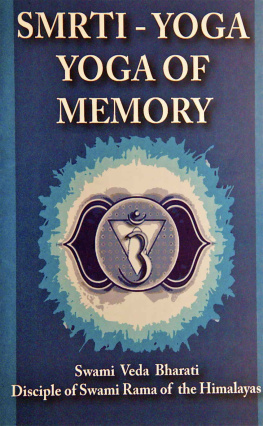Swami Veda Bharati - Daily Schedule of a Sadhaka
Here you can read online Swami Veda Bharati - Daily Schedule of a Sadhaka full text of the book (entire story) in english for free. Download pdf and epub, get meaning, cover and reviews about this ebook. year: 2017, publisher: Himalayan Yoga Publications Trust, genre: Religion. Description of the work, (preface) as well as reviews are available. Best literature library LitArk.com created for fans of good reading and offers a wide selection of genres:
Romance novel
Science fiction
Adventure
Detective
Science
History
Home and family
Prose
Art
Politics
Computer
Non-fiction
Religion
Business
Children
Humor
Choose a favorite category and find really read worthwhile books. Enjoy immersion in the world of imagination, feel the emotions of the characters or learn something new for yourself, make an fascinating discovery.
- Book:Daily Schedule of a Sadhaka
- Author:
- Publisher:Himalayan Yoga Publications Trust
- Genre:
- Year:2017
- Rating:3 / 5
- Favourites:Add to favourites
- Your mark:
- 60
- 1
- 2
- 3
- 4
- 5
Daily Schedule of a Sadhaka: summary, description and annotation
We offer to read an annotation, description, summary or preface (depends on what the author of the book "Daily Schedule of a Sadhaka" wrote himself). If you haven't found the necessary information about the book — write in the comments, we will try to find it.
Daily Schedule of a Sadhaka — read online for free the complete book (whole text) full work
Below is the text of the book, divided by pages. System saving the place of the last page read, allows you to conveniently read the book "Daily Schedule of a Sadhaka" online for free, without having to search again every time where you left off. Put a bookmark, and you can go to the page where you finished reading at any time.
Font size:
Interval:
Bookmark:
Also by the same author:
YOGA SUTRAS OF PATANJALI VOLS I & II
NIGHT BIRDS
YOGI IN THE LAB
KUNDALINI: STILLED OR STIRRED
SONG OF THE LORD: GITA IN THE YOGA VASISTHA
WHAT IS RIGHT WITH THE WORLD: THE HUMAN URGE FOR PEACE
MANTRA THE SACRED CHANTS
MEDITATION THE ART & SCIENCE
MEDITATION & THE ART OF DYING
MANTRA & MEDITATION
PHILOSOPHY OF HATHA YOGA
PERFUMES FROM THE VALLEY OF FLOWERS
108 BLOSSOMS FROM THE GURU GRANTH GARDEN
THOUSAND NAMES OF KUNDALINI
And many more books, booklets and audios
Copyright 2007 Swami Veda Bharati
Cover photo credit: Dr Stephen Parker
All rights reserved. No part of this book may be reproduced, stored in a retrieval system, or transmitted in any form or by any means, electronic, mechanical, photocopying, recording or otherwise, without the prior permission in writing of the copyright owner.

Himalayan Yoga Publications Trust
Swami Rama Sadhaka Grama (SRSG)
Virpur Khurd, Virbhadra Road
Rishikesh 249 203 (India)
Tel: +91-135-2453030
Email: info@yogapublications.org
Website: www.yogapublications.org
Daily Schedule of a Sadhaka

There's no point in philosophy; there's no point in information. The point that is important is practice. There are very simple things about practice, very, very simple things. All you have to do is think of regularity, frequency, length, depth, and surrender. Nothing else.
Regularity in Meditation
Regularity like your annual doctor's visit. Without regularity you will not benefit. If you meditate one day and then don't meditate for two days, on the fourth day you're starting right from the beginning. The mind is like water, meditation is like ice. To turn the random mind into a meditative mind is like freezing water into ice, giving it a fixed shape, giving it a definite direction, or opening certain channels for the flowing water, or turning a flood into a channel. If you make a few holes in the ground today and then nothing for three, four, or five days, you will have to start all over again. Regularity.
Frequency of Meditation
Frequency, twice a day. Regularity, frequency. Do it regularly, do it frequently. Twice a day. Try to repeat it many times.
Length and Depth of Meditation
Length, you determine according to your time, your inclination, and your physical and mental strength. If you sit for two hours and you don't really meditate and let your mind run around, then you have not spent any time in meditation. But if out of two hours you have spent even two minutes of real intense concentration without a break in your breath, you get somewhere. If for five minutes in the morning and five minutes in the evening out of your entire sitting period, you can sit without a break, you accomplish something.
Surrender in Meditation
Then surrender. That is the most important point, surrender and depth. Depth and surrender. Regularity, depth, and surrender; if you can combine these three you're fine. Surrender means that in meditation you do not compete, not race, not want to accomplish, not want to reach a goal, none of these. Just do it, let it flow. Surrender your body, relax it; surrender your mind, empty it of all thoughts.
The Wealth and Morality of a Sadhaka
You have a wealth. A human being is born with a certain amount of wealth. His wealth is counted not in thousand dollar bills, not in hundred dollar bills, not in dimes or pennies. Your wealth is counted in the number of years, number of months, number of days, number of breaths that you have. And let me tell you this. The number of breaths you spend meditating are well spent; the number of breaths you spend without meditation are being thrown in the garbage. It's like taking your diamonds, taking your pennies, taking your bundles upon bundles of hundred dollar bills and throwing them in the garbage can. So the breaths you use meditatively are the only breaths used properly; the rest is a waste of life.
I have only one definition of morality, and that is to ask of any thought, speech or activity: Will this lead me to self-realisation? Will this lead to the vast perfection man is capable of? If you believe in a God, will this lead me to God realisation? If it doesn't then it is immoral, it's no use, it's worthless. If eating certain kinds of food in a certain way and in a certain amount will prevent my going towards that goal, then it's immoral. If uttering a word will lead me to the center of my inner silence, it is a moral word, if it will not it's a useless thing, it's a waste. If accomplishing wealth, if gathering money will later on give me time to meditate, then go ahead and gather wealth. Otherwise God knows how many millionaires have been born on this earth but are unremembered. People remember Christ, they don't remember the millionaires of ancient Rome.
Daily Schedule
Here are a few hints as a matter of advice for those of you who want to change your lifestyle: a schedule for the day, an attitude to carry throughout the day. I believe most of you will not want to practice these things, but it is my duty to give them.
Waking Up
Wake up in the morning unless you are really jarred by the cry of a child, which of course you cannot help wake up by using your mental alarm, meaning that you go to sleep at night with a relaxation; and at the end of the relaxation as you are falling asleep, concentrate inside your head and your heart center and say, "5:30 A.M.", "Arya, wake me up at 5:30", "John, will you wake me up at 5:30?" Tell that to your name. Your subtle body will wake you up. Set your ordinary outside alarm clock for 5:35 so that if you don't wake up at 5:30 then the external aid is present. But set that alarm before you begin your relaxation exercise for the night.
So at 5:30 wake up. Immediately sit up in your bed immediately, not lying down turning this way and that way, "I'll wake up in five minutes." Five minutes sometimes lasts for two hours! The moment you allow yourself two minutes, they are easy to stretch into two hours. So don't allow yourselves those extra two minutes or extra five minutes. Your eyes are opened, get up! Tell whoever it is who is sleeping inside you, "Come on, up, sit up."
There are three things you can do:
a) Keep a small mirror under your pillow. When you wake up take out that mirror before you see anything else, before you see anybody else's face, sitting right there on your bed, look at your face, then put the mirror aside. That's one way. When I was a child my first concentration was my face. From the age of four and a half to about the age of eight, for four years my concentration was on my face. First thing in the morning upon waking up, see your face.
b) Open your eyes the way you open your eyes from meditation. The consciousness should be changed very gently. Come out into the world and open your eyes to your hands putting the full concentration of the mind onto your hands. Try this. Close your eyes. Now open your hands like a book and read your hands from left to right, from top to bottom like a book. Concentrate on each part so that you are not seeing anything else but those parts where your eyes are falling like a book. Then breathe gently. Don't think any thoughts. Then put your hands aside.
c) There is a practice called baka-mudra . It is the mudra of simultaneously seeing no evil, hearing no evil, speaking no evil. Try it for three weeks every morning. You take a pillow and get into the baka-mudra position right on your bed. One sits in a sort of squatting position. Cover the ears with the thumbs, slightly pressing the ear flap. The edge of the eyelids are covered with the index fingers (do not press the retina of the eyes). The nostrils are gently pressed together with the middle fingers. Leave the pressure a little loose to keep breathing gently. The other two fingers go over the mouth. Maintain the root lock and the tongue lock. Listen to the interior hum. Every morning sit there for five minutes or so with ears, eyes, and mouth closed and just observe what reaction you get. Don't think of anything else, not even your mantra, unless it really comes into your mind. Be aware of whatever reaction you get, what kinds of sounds, sights, and senses. Maybe nothing will happen. Perhaps you will see diamonds, perhaps you will see lights, perhaps you will see colors, perhaps you will hear some particular pitches of sound, whatever. Be aware.
Font size:
Interval:
Bookmark:
Similar books «Daily Schedule of a Sadhaka»
Look at similar books to Daily Schedule of a Sadhaka. We have selected literature similar in name and meaning in the hope of providing readers with more options to find new, interesting, not yet read works.
Discussion, reviews of the book Daily Schedule of a Sadhaka and just readers' own opinions. Leave your comments, write what you think about the work, its meaning or the main characters. Specify what exactly you liked and what you didn't like, and why you think so.












